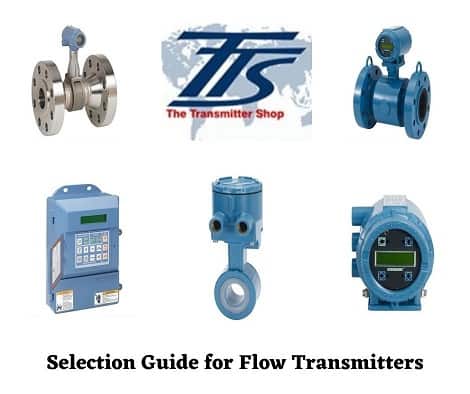Key Considerations When Choosing the Right Flow Transmitter

When selecting a flow transmitter for your industrial process, there are several important factors you need to take into account. These considerations will help ensure that you choose the right transmitter for your specific needs.
- Properties of the Fluid:
The type of fluid being measured plays a crucial role in determining the best flow transmitter. Whether you're dealing with liquids or gases, the characteristics of the fluid will influence the choice. Key fluid properties include:
- State of the Fluid: Determine if the fluid is liquid or gaseous, as this will guide the selection of the appropriate flow sensor.
- Density: The density of the fluid impacts its pressure, so it's important to consider this factor.
- Viscosity: The flow of the fluid is affected by its viscosity, making it a critical property to evaluate.
- Chemical Composition and Reactivity: Certain fluids may react with materials, leading to hazardous situations. It's essential to test the chemical composition and reactivity of the fluid before selecting a transmitter.
- Flow Metering Setup:
Flow sensors often employ different types of metering setups. These methodologies affect the sensitivity, accuracy, and overall functionality of the flow transmitter. Common metering setups include:
- Orifice Plates: These measure liquid flow by calculating the pressure difference across a narrow orifice. The varying cross-section of the orifice allows for precise measurements.
- Venturi Tubes: Utilizing the Bernoulli Effect, Venturi tubes measure flow by observing pressure and flow variations. This method is highly efficient, with up to 90% pressure recovery.
- Flow Nozzles: Similar to Venturi tubes, flow nozzles also measure flow using differential pressure but do not recover pressure.
- Pilot Tubes: These consist of two small-diameter tubes, one for measuring pressure impact and the other for assessing potential differences, which affects the flow transmission rate.
Each metering setup has its own advantages and limitations, so understanding these is vital for proper selection.
- Electronics:
As flow transmitters are electromechanical devices, the electronics play a significant role in their performance. The feedback circuitry within the transmitter determines its efficiency in monitoring and controlling flow. Before purchasing, consider the following electronic aspects:
- Electric input
- Analog current
- Voltage
- Frequency and pulse signals
Ensuring that the transmitter meets your electronic requirements is essential for seamless operation.
- Accuracy:
Accuracy is paramount when selecting a flow transmitter. Ideally, you should opt for transmitters with an accuracy of at least 0.15%. Higher accuracy ensures more reliable flow measurement and control.
- Material:
The material of the transmitter must withstand harsh environments, including extreme temperatures and pressures. Chemical tolerance, corrosion resistance, and temperature tolerance are critical factors to consider when selecting the material.
- Quality Standards:
Compliance with industry standards, such as ISO and RoHS, is necessary to ensure the quality and reliability of the flow transmitter. Always verify that the product meets these standards before purchasing.
With all these considerations in mind, it’s crucial to choose a reputable manufacturer or supplier to guarantee the quality and performance of your flow transmitter. A trusted source like The Transmitter Shop offers high-quality products from reputable brands such as Foxboro and Rosemount.
Related Articles
- Steps for Calibrating a Pressure Gauge
- All About Reconditioned Transmitters
- Is a Remanufactured Transmitter Better Than a New One?
- How Differential Pressure Transmitters Assist in Flow Measurements
- Calibration Frequency for Pressure Transducers
- Troubleshooting Pressure Transducers
- Calibrating a Pressure Transmitter – Part II
- Calibrating a Pressure Transmitter – Part I
- Three Unique Uses of Pressure Transmitters
- Features and Benefits of Rosemount 1199 Direct Mount Transmitters
- Three Major Technologies Behind the Popularity of Pressure Transmitters
- An Unusual Guide to Selecting the Ideal Pressure Sensor
- Distinguishing Between $40 and $400 Pressure Transmitters
- Improving the Performance and Lifespan of Pressure Transmitters
- Selecting the Right Pressure Transmitter Manifold
- Safety Tips for Operating Differential Pressure Transmitters
- Impact of Shock and Vibration on Pressure Transducers
- Rosemount 3051S vs 3051C Transmitter – Which One Should You Pick?
- Rosemount 2088 vs Rosemount 3051 – Key Differences
- What Are Diaphragm Seals and Their Types?
- Difference Between Conventional and Smart Transmitters
- Choosing the Right Diaphragm Seal for Your Application
- Selecting the Best Pressure Transmitter for Your Needs
- Remote Seals: Importance, Working Principle, and Applications
- How to Calibrate a Flow Transmitter?
- What Is an Absolute Pressure Transmitter and How Does It Work?
- HART Communication Protocol: Overview, Functionality, and Benefits in Industrial Automation
- Absolute and Gauge Pressure Transmitters: Overview and Working Principles
- Flow Meter vs Flow Transmitter: Key Differences
- Selecting the Right Temperature Transmitter for Your Application
- Testing 4 to 20mA Signals in a Pressure Transmitter
- Understanding Multivariable Transmitters: Functionality and Applications
- Pressure Transmitters vs. Pressure Transducers: Key Differences
- Calculating the Accuracy of a Pressure Transmitter
- Ultimate Guide to Selecting Flow Transmitters
- Challenges and Benefits of HVAC System Balancing
- Understanding Pressure Ranges and Units for Fluid Monitoring
- Impact of Pressure Fluctuations on Drying Efficiency
- Monitoring and Controlling Energy Production in Power Plants
- Common Challenges in Air Flow Measurement and Solutions
- Pressure Monitoring in Pump Systems: A Comprehensive Guide
- Measuring Density and Viscosity in Industrial Processes
Hot Rolled Magnesium Alloy Plate
Magnesium Alloy Plate,Hot Rolled Magnesium Plate,Hot Rolled Magnesium Alloy Sheet,Lightweight Magnesium Alloy Plate
Luoyang Maige Magnesium Industry Co., Ltd , https://www.maigemagnesium.com
